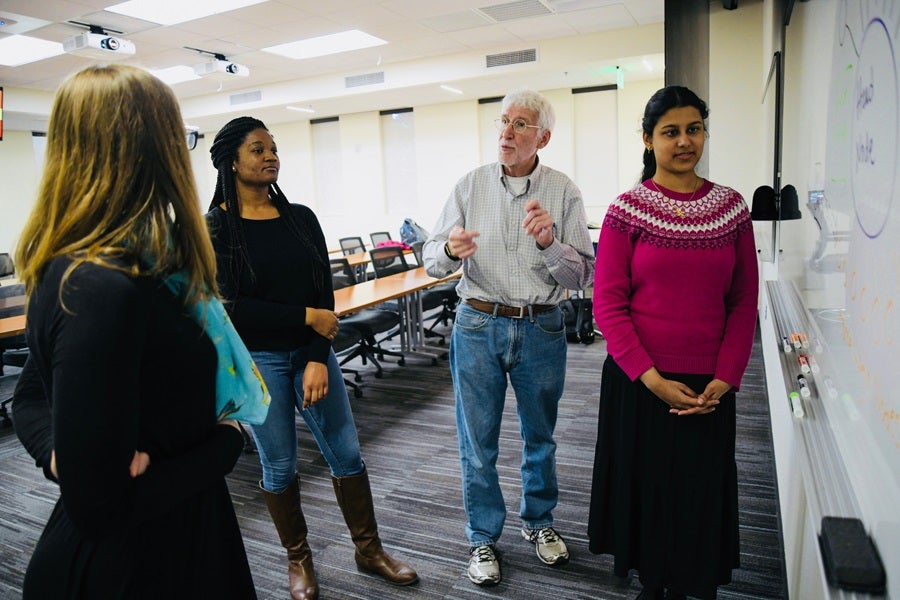ASU students learn to analyze data through new computational biology certificate

ASU School of Life Sciences assistant professor Melissa Wilson teaches students how to work with their data during a computational biology work group. Any student who would like to learn to analyze their data is welcome to attend whether enrolled in the class or not. Photo by Samantha Lloyd/ASU VisLab
Any scientist who has struggled to analyze their data is familiar with the situation: sitting in front of the computer, searching the internet or previous literature, hoping to find someone else with a similar problem. It can be a frustrating — and lonely — experience.
Arizona State University's School of Life Sciences is working to change that through a new computational life sciences certificate program for both undergraduate and graduate students, the brainchild of Assistant Professor Melissa Wilson and Professor Kenneth Buetow.
“Computational skills are no longer an option for our students. They are a requirement,” Wilson said. “And to this point, we haven’t had a structured program for students to gain those skills. To me, one of the huge benefits of the computational biology program as a whole is that we’ll train students in computational and quantitative life sciences, and, they’ll have a community they can work with.”
Rather than introducing a new major, Wilson and Buetow developed a certificate that complements any major or graduate degree program. Undergraduates will take two required courses and have a choice between courses for an additional nine credits. Graduate students will have one required course called “Responsible Conduct of Research” and choose an additional 15 credits.
“As we’re transitioning in the life sciences, computational skills are as important as any other investigative tool you might use. Students who are not adept in this space are going to find themselves already behind as they move forward,” Buetow said. “This is one of those things we can lead in at ASU. The certificates are not standalones; they’re integrated into all life sciences programs.”
The certificates include classes in molecular genetics and genomics, phylogenetic biology and analysis, principles of different coding programs for biologists, ecological modeling, current topics in systematics and many more. There are also classes centered on new statistical programs or web-based tools.
Who needs computational biology? Well, basically everyone. Computational biology is defined as the science of using biological data to understand biological systems and relationships. That means any scientist or student who analyzes data to answer their questions needs computational biology.

ASU students Karen Funderburk (second from left) and Mary Pardhe (right) discuss their data with SOLS professors Kenneth Buetow and Melissa Wilson at a computational biology working group. The class is offered through Bio 598 Practical Applications in Computational Life Sciences and will be one of the seminar courses available in the computational life sciences certificate program this fall. Photo by Samantha Lloyd/ASU VisLab
The certificate will launch in the fall semester of 2019. While they hope to recruit at least 10 students, they also want to build a community where students and faculty can learn from and help one another. Currently, Wilson leads a weekly computational work group where anyone can show up to get help analyzing their data. And, Assistant Professor Reed Cartwright leads a reading group where students can learn about new statistical methods.
As the program grows, they envision more community-building activities, such as an annual symposium where scientists of all disciplines come together to talk about their data.
However, for now, they are focused on creating a place where all students can improve their computational skills.
“There are so many people working in isolation, so many struggling, and so many reinventing the wheel. Each person wanting to do computational life sciences right now has to figure out how to do it on their own,” Buetow said. “Once people become aware of this, people will realize that they don’t have to figure out on their own. There’s a whole community of people who can assist them.”
More Science and technology

Transforming Arizona’s highways for a smoother drive
Imagine you’re driving down a smooth stretch of road. Your tires have firm traction. There are no potholes you need to swerve to…

The Sun Devil who revolutionized kitty litter
If you have a cat, there’s a good chance you’re benefiting from the work of an Arizona State University alumna. In honor of…

ASU to host 2 new 51 Pegasi b Fellows, cementing leadership in exoplanet research
Arizona State University continues its rapid rise in planetary astronomy, welcoming two new 51 Pegasi b Fellows to its exoplanet…

